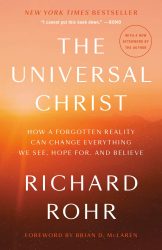Can Richard Rohr’s 2019 bestseller help to inform and enhance Christian Universalism?

When a friend recommended The Universal Christ and gave it to me as a gift recently, I was excited to read it for several reasons, one of which being Richard Rohr’s reputation as one of the top theological writers of our time. However, as a Christian Universalist I admit to being very intrigued by its title. I wondered if it meant the book may have special relevance to CU, even if that wasn’t necessarily the author’s intent. It didn’t take long for the book to answer that question with a resounding yes.
In considering how Rohr’s message impacts Christian Universalism, it is important to note the Franciscan priest identifies himself as a Universalist, and though he doesn’t use that terminology to describe himself he clearly speaks to his belief in universal salvation. He emphatically states his agreement with many of the faith principles common in Universalist thought and is highly critical of those doctrines of orthodoxy that are most directly in opposition to those held by most CUs.
For example, Rohr points out that the doctrine of original sin was never mentioned in the Bible and wasn’t even proposed by the church patriarchs until Augustine did so in the fifth century. Even then the concept didn’t take full hold within the church until the 11th century when St. Anselm devised the equally abhorrent vicarious atonement theory, which states that Jesus died on the cross because God couldn’t forgive humanity for its original sin (a false concept itself) until there was a blood sacrifice of a divine cosmic clone of God as a substitute for the punishment humanity deserved. Rohr is unsparing in describing the horrible impact these two doctrines have had on Christian faith, including how God has been depicted as a sadistic deity that needs payment before He can love His creation, and that nothing Jesus said, did, or taught in his lifetime means anything because his death is all that matters for our salvation. Rohr states that for Christianity’s fullest and deepest meaning to emerge, we must reject “any theory of salvation that is based on violence, exclusion, social pressure, or moral coercion.”
Yet as gratifying as it is to read how Rohr’s views on soteriology or salvation are in harmony with Christian Universalism, it is by reading Rohr describe The Universal Christ of the book’s title we get an idea of how much it can broaden and enrich the actual meaning of CU beyond the salvation doctrine by which it is most identified.
The Universal Christ is the term Rohr uses to describe Creation, which he also calls the First Incarnation. What this means is Creation is God’s emanation of Godself, and the physical universe is composed in its entirety by Godself. Divine DNA saturates all the physical structures of existence, so in this way we should conceive of all matter in the cosmos as being God’s body or physical manifestation. It is the Christ described in the Bible as existing “from the beginning” in numerous scriptural passages, which Rohr graciously includes for us. Most notably it is in the opening section of the gospel of John where this concept is most vividly described. Here we see Christ is the “Logos” through whom “all things came into being” (John 1:3).
Rohr is using Biblical testimony to state his belief in Panentheism, a philosophy that asserts God/Divinity immerses and constitutes the entire physical universe and also transcends it, existing beyond space and time in some way as well. And while this philosophy seems basic and agreeable enough to most spiritually or metaphysically minded people, when it is applied to the orthodox Christianity most people are familiar with, it foundationally and fundamentally changes it in significant ways. It is this Panentheistic Christianity that has vast and profound implications for all Christians, perhaps especially Christian Universalists.
There are likely many CU’s already familiar with panentheism, especially those of us that have delved into CU literature, both in print and online on the CUA website. As a theological concept it works very well with Apocatastasis, another widely espoused doctrine in CU and one Rohr also endorses in The Universal Christ. This states that the universal reconciliation with God all CU’s expect in the fullness of time will include not just every human or sentient being, but every particle in the physical universe. Everything that exists is an emanation or manifestation of the Godhead, so it too will return “home” and fully merge and reunite with the Divine Spirit.
However, even if you are a person familiar with these concepts and doctrines, there is a power in Rohr’s writing that is very clarifying and persuasive. Surely his exceptional writing skills play a key role in this, but whatever it is, I feel Rohr has the gift of presenting his theories in a way that lends them authority and makes them very convincing. And in this book the subject matter is of particular interest to CU’s. I think that The Universal Christ shows us how we can add a lot of substance to CU and even enhance and augment what it means and stands for.
As trite as this may sound, it’s enlightening to see how often Rohr uses the word “universal” and similar words like “all” and “eternal” and see how applicable they are to his theological vision. It befits a person whose perspective on the sacredness of Nature/Reality is as all encompassing as his is.
The most obvious thing Christian Universalism should take from Rohr is to make the First Incarnation/Universal Christ a more prominent part of our creed or doctrine. The first of the seven articles of our beautifully expressed Spiritual Perspective (which I believe serves as what would be our official creed or faith statement as in other denominations), describes God as the Creator of the universe, but I believe a more holistic expression would be God is the Source AND Substance of All Being. This spiritualizes and makes sacred all that we see and tells us the Divine or Spirit has always been intrinsic to what we’ve thought was just physical matter.
This also tells us that the Christ isn’t something that has only manifested once in history in the person of Jesus, and perhaps some of us may feel uneasy about seemingly placing Jesus in a secondary role. Rohr points out though that recognizing the Christ that immerses the world is the same Christ that was imbued in Jesus the person actually elevates Jesus and gives him a universal (there’s that word again) stature that is otherwise lacking. Rohr writes “history has shown that the worship of Jesus without worship of Christ (in both incarnations) invariably becomes a time- and culture-bound religion, often ethnic or even implicitly racist, which excludes much of humanity from God’s embrace.” I believe the God and Christ we testify to in Christian Universalism and present to the world should be that Universal, Eternal and Omnipresent Source and Substance of All Being that Rohr describes in this brilliant book.
In a book chock full of fascinating and beautiful words and ideas there is still one sentence that stands out and encapsulates all that The Universal Christ expresses. “God loves things by becoming them,” meaning God loves the entire Universe and everything and everyone in it. Amen.
There is only Christ. He is everything and he is in everything. (Colossians 3:11)

Celtic Christian Spirituality states the same thing. John Philip Newell quotes John Scotus Eriugena in his book, “The Book of Creation: An Introduction to Celtic Spirituality” (1999) — “[The creation account in Genesis 1] is a meditation on the ever-present mystery of creation. To say that light is created on the first day is to say that light is at the heart of life….it is the essence or centre from which life proceeds. At the heart of all that has life is the light of God.”
And Timothy Joyce states in his book, “Celtic Christianity: A Sacred Tradition, a Vision of Hope” (1998) — “[Creation] is graced by God and by the immanence of this God; creation is filled with God’s presence…”
With that stated, I’ve been wanting to get this book from Rohr and you’ve sealed the deal for me!
Grace to you.
Dear Br. Gillespie,
It’s amazing how you made a reference to John Scotus the Irishman, because right before I made my proposal to Lance Haverkamp on the Rohr article, I considered writing something on the Periphyseon by Scotus. So I want to thank you for your reply because now I feel inspired to look into Celtic Christianity further. Thank you sir, and I’m glad you enjoyed my article.
In Christ,
Peter
Same concept of God as mine, consistent with good theology and good science. My website: http://www.ToughestLifeQuestions.com
Richard Rohr has been a spiritual mentor of mine for many, many years, including when I served the Unitarian Universalist Association. It’s too bad that so many UU’s self-identify as secular humanists and miss the boat on deepening their own spirituality. I have been a United Church of Canada minister since 2010, and it has been a good journey. Not without institutional problems (they exist in any denomination) but a good “home” for me. With the start of the CUA in 2007, I rarely could understand why there was so much angst about universal salvation, having never felt that the idea of eternal damnation was possible from a loving God. So I’m glad to have read this review of Richard Rohr’s book here! I’m glad that the CUA resonates with his profound wisdom.
This book saved my faith and began a beautiful phoenix out of the ashes story. I now hold Richard Rohr’s alternative orthodoxy.
One of my favorite books to gift a friend!